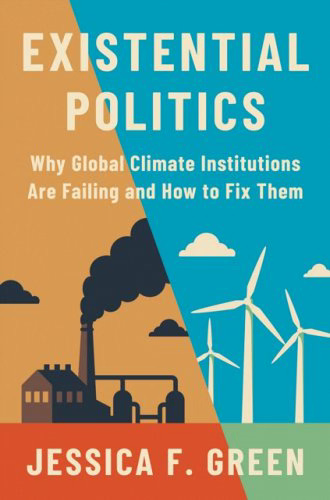We Start at the End
Exit music for this episode is “Oil Money” by Graham Barham. Because, well, it’s a bit obvious this time, no?
If insanity is doing the same thing repeatedly and expecting a different result, global climate institutions like the annual COP meetings are definitionally loopier than Elon Musk deep down a K-hole.
We spend our time arguing about how to count emissions in order to avoid the real conversation, which is a struggle between three asset classes: fossil fuel assets, ‘vulnerable’ assets (like Small Island Developing States), and ‘green’ assets. Pretending that struggle is not existential is the essence of climate diplomacy for the past 35 years.
University of Toronto political scientist Professor Jessica Green thinks we’re well past the point we can afford to continue pretending. Reading her forthcoming book, Existential Politics - Why Global Climate Institutions are Failing and How to Fix Them, was like waking from a dream. You should pre-order it now.
She cuts through the nonsense to focus on the real dilemma. The only way through an “energy transition” is for fossil fuel companies, enormously powerful economic and political actors, to have $trillions in ‘stranded assets’ and balance sheets that go up in smoke.
Turkeys don’t vote for Christmas (an idiomatic expression I’m pleased to be the first to share with Prof. Green). Yet the entire structure of global climate diplomacy is built on the fallacy that, somehow, oil majors and NOCs would ignore their self-interest and agree to die.
As you’ll hear in our conversation, Prof. Green doesn’t pull punches and doesn’t suffer fools. There’s an impatience in her writing and her presentation that has a lot of James Dyke “fuck this noise can we please stop kidding ourselves” energy.1 At some points I wanted to reach for the hemlock, but thankfully she is as witty as she is sharp.
I ask her how her ideas intersect or cut against other critiques of the mainstream climate conversation like Andreas Malm and Wim Carton2 in Overshoot, Rupert Read’s take on transformative adaptation and Tadzio Mueller’s anticipation of collapse.
I think you’ll enjoy the chat. Let us know what you think:
In this Conversation
01:48 Existential Politics Explained
04:18 The Flaws in Carbon Markets
05:47 Distributional Politics and Climate Policy
08:36 The Role of Corporations in Climate Governance
10:49 The Paris Agreement and Its Shortcomings
19:26 The Misconception of Solving Climate Change Like the Ozone Problem
20:54 Environmental Effects and Substitutes
22:04 Challenges in Environmental Governance
22:57 Market Dynamics and Trade Issues
25:03 Fossil Capital vs. Green Capital
28:31 The Role of Litigation and Policy
37:11 Grand Bargains and Political Realities
38:21 Carbon Capture and Storage Debate
40:26 Buy this Book!
All the Outros
I’m not sure what a shrink would make of our outro listening pattern but we think it’s got some quality stuff in there - coming up towards 150 tracks in the list. Yikes!
If you haven’t signed up for Eccentric Orbits you need to fix that shit. Start with this:
Excited to say we’ll be interviewing Wim Carton soon to talk about the second part of their work after Overshoot, also coming out in October.















